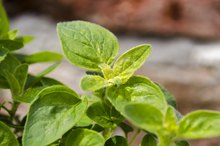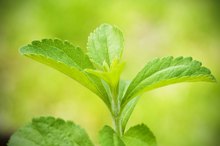Decaf Black Tea & Pregnancy
There are a number of foods and beverages you may be used to drinking that aren't a good idea during pregnancy, because they contain chemicals that can harm your developing fetus. While regular black tea is best avoided, you can safely drink decaffeinated black tea during your pregnancy.
Caffeine
Caffeine is a stimulant compound that activates the "sympathetic" branch of your nervous system, also called the "fight or flight" portion of the system. This branch of the nervous system assists you in dealing with stressful events by responding appropriately. As a result, caffeine makes you feel more alert and awake, while also increasing your heart rate, respiration rate and blood flow to the extremities. It's found in many beverages, including coffee and both black and green tea.
- Caffeine is a stimulant compound that activates the "sympathetic" branch of your nervous system, also called the "fight or flight" portion of the system.
Black Tea and Pregnancy
Caffeine Content in One Cup of Coffee Vs. One Shot of Espresso
Learn More
During pregnancy, it's best to avoid some teas because of specific ingredients. For instance, caffeine can cross the placenta and increase your risk of miscarriage if you consume it in large quantities, explain Drs. Michael Roizen and Mehmet Oz in their book "You: Having A Baby." Black tea, however, is safe once the caffeine has been removed. You can drink decaffeinated black tea without worrying that you'll harm your baby.
- During pregnancy, it's best to avoid some teas because of specific ingredients.
Tea Additives
While black tea made from tea leaves is safe during pregnancy -- provided it's decaffeinated -- there are many herbal substances sold as teas or added to black tea that aren't necessarily a good idea. Food-grade herbs, such as ginger and pepper, are generally safe. Nonfood herbs, however, haven't always been tested for safety during pregnancy, explain Drs. Roizen and Oz. If your decaf black tea has nonfood herbs in it, talk to your obstetrician before drinking it.
- While black tea made from tea leaves is safe during pregnancy -- provided it's decaffeinated -- there are many herbal substances sold as teas or added to black tea that aren't necessarily a good idea.
Other Considerations
Tulsi Tea and Pregnancy
Learn More
If you choose to sweeten your decaffeinated black tea to give it a milder flavor, be aware that some sweeteners aren't appropriate for use during pregnancy. While they're popular because they don't contain calories, artificial sweeteners such as sucralose and aspartame haven't been tested for safety in pregnant women, explain Heidi Murkoff and Sharon Mazel in their book "What To Expect When You're Expecting." It's safest to sweeten your tea with sugar or honey.
Related Articles
References
- “You: Having A Baby”; Michael Roizen, M.D. and Mehmet Oz, M.D.; 2009
- “What to Expect When You’re Expecting”; Heidi Murkoff and Sharon Mazel; 2008
- Chin JM, Merves ML, Goldberger BA, Sampson-cone A, Cone EJ. Caffeine content of brewed teas. J Anal Toxicol. 2008;32(8):702-4. doi:10.1093/jat/32.8.702
- Yarmolinsky J, Gon G, Edwards P. Effect of tea on blood pressure for secondary prevention of cardiovascular disease: a systematic review and meta-analysis of randomized controlled trials. Nutr Rev. 2015;73(4):236-46. doi:10.1093/nutrit/nuv001
- Hartley L, Flowers N, Holmes J, et al. Green and black tea for the primary prevention of cardiovascular disease. Cochrane Database Syst Rev. 2013;(6):CD009934. doi:10.1002/14651858.CD009934.pub2
- Shen W, Xiao Y, Ying X, et al. Tea Consumption and Cognitive Impairment: A Cross-Sectional Study among Chinese Elderly. PLoS ONE. 2015;10(9):e0137781. doi:10.1371/journal.pone.0137781
- Noguchi-shinohara M, Yuki S, Dohmoto C, et al. Consumption of green tea, but not black tea or coffee, is associated with reduced risk of cognitive decline. PLoS ONE. 2014;9(5):e96013. doi:10.1371/journal.pone.0096013
- Feng L, Langsetmo L, Yaffe K, et al. No Effects of Black Tea on Cognitive Decline Among Older US Men: A Prospective Cohort Study. J Alzheimers Dis. 2018;65(1):99-105. doi:10.3233/JAD-180103
- Butacnum A, Chongsuwat R, Bumrungpert A. Black tea consumption improves postprandial glycemic control in normal and pre-diabetic subjects: a randomized, double-blind, placebo-controlled crossover study. Asia Pac J Clin Nutr. 2017;26(1):59-64. doi:10.6133/apjcn.112015.08
- Lin YW, Hu ZH, Wang X, et al. Tea consumption and prostate cancer: an updated meta-analysis. World J Surg Oncol. 2014;12:38. doi:10.1186/1477-7819-12-38
- Zhou Q, Li H, Zhou JG, Ma Y, Wu T, Ma H. Green tea, black tea consumption and risk of endometrial cancer: a systematic review and meta-analysis. Arch Gynecol Obstet. 2016;293(1):143-155. doi:10.1007/s00404-015-3811-1
- Yu F, Jin Z, Jiang H, et al. Tea consumption and the risk of five major cancers: a dose-response meta-analysis of prospective studies. BMC Cancer. 2014;14:197. doi:10.1186/1471-2407-14-197
- Nie XC, Dong DS, Bai Y, Xia P. Meta-analysis of black tea consumption and breast cancer risk: update 2013. Nutr Cancer. 2014;66(6):1009-14. doi:10.1080/01635581.2014.936947
- Sofuoglu SC, Kavcar P. An exposure and risk assessment for fluoride and trace metals in black tea. J Hazard Mater. 2008;158(2-3):392-400. doi:10.1016/j.jhazmat.2008.01.086
- Zioła-frankowska A, Frankowski M, Novotny K, Kanicky V. Comparison of the level of boron concentrations in black teas with fruit teas available on the Polish market. ScientificWorldJournal. 2014;2014:898425. doi:10.1155/2014/898425
- Karak T, Kutu FR, Nath JR, et al. Micronutrients (B, Co, Cu, Fe, Mn, Mo, and Zn) content in made tea (Camellia sinensis L.) and tea infusion with health prospect: A critical review. Crit Rev Food Sci Nutr. 2017;57(14):2996-3034. doi:10.1080/10408398.2015.1083534
Writer Bio
Kirstin Hendrickson is a writer, teacher, coach, athlete and author of the textbook "Chemistry In The World." She's been teaching and writing about health, wellness and nutrition for more than 10 years. She has a Bachelor of Science in zoology, a Bachelor of Science in psychology, a Master of Science in chemistry and a doctoral degree in bioorganic chemistry.









